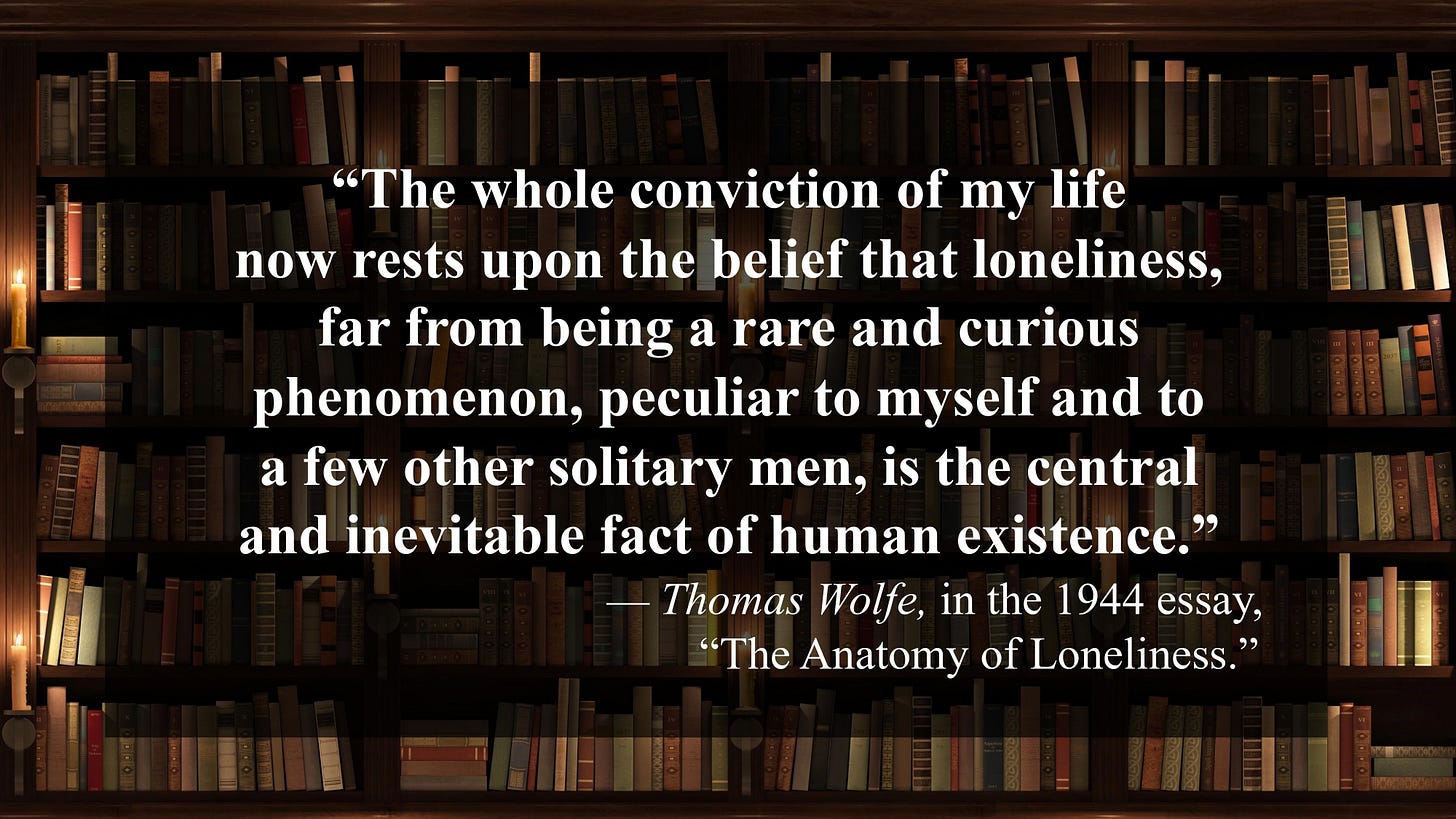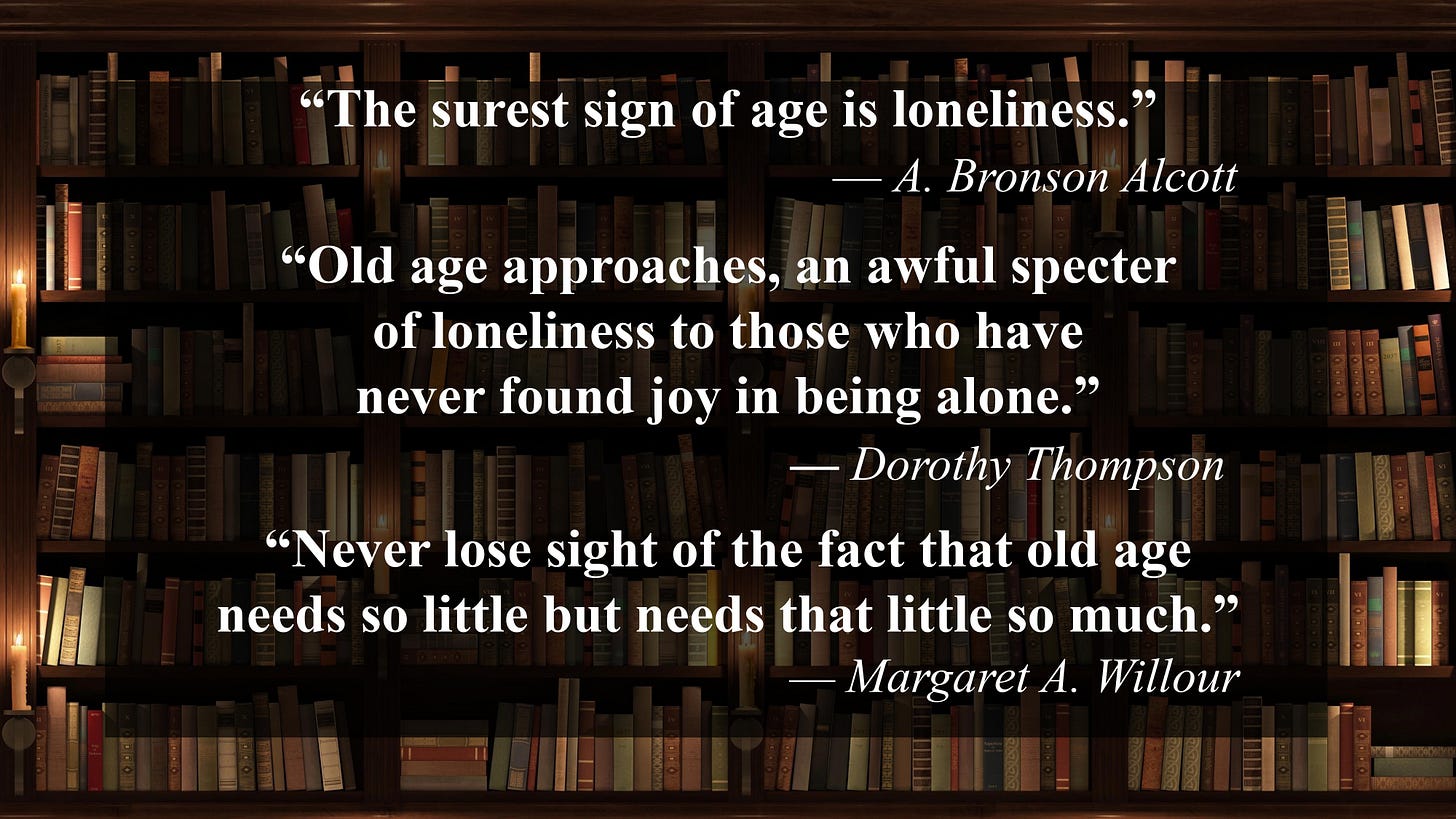Dr. Mardy's Quotes of the Week "Loneliness" (Reprised)
December 8-14, 2023 | THIS WEEK'S THEME: “Loneliness” (Reprised)
Taking One More Week Off
I’m taking one more break from my regular schedule to concentrate on my upcoming compilation of “The 24 Best Opening Lines of 2024.” As I said last week, this will be my fifth annual compilation, all published on Michael Smerconish’s daily newsletter (you can find links to the first four lists here). This week, I’ve slightly refreshed a post from exactly one year ago.
Opening Line of the Week
The opening lines of many works of fiction read as if they were passages from a textbook of psychology or a self-help book—and that is the case here. In Jaffe’s short story, the narrator explains why people are so reluctant to admit they are lonely:
“I guess that’s because it’s the one weakness we all secretly feel should be the easiest to overcome, and we secretly feel guilty that we can’t.”
For over 2,000 memorable opening lines from every genre of world literature, go to www.GreatOpeningLines.com.
This Week’s Puzzler
On Dec. 14, 1953, this woman died at age 57 in St. Augustine, Florida. At her death, she was best known as the author of The Yearling (1938), an endearing story about Jody Baxter, a backwoods Florida boy who adopts a young fawn.
The Yearling became the bestselling American novel of 1938, topping the New York Times Best Seller list for twenty-three consecutive weeks. Awarded the Pulitzer Prize for fiction the following year, it was adapted into a popular 1946 film starring Gregory Peck and Jane Wyman as the boy’s parents.
After a nationwide search, Claude Jarman, Jr., an unknown fifth-grader from Nashville, Tennessee was cast as Jody. At the Oscar ceremonies later in the year, he received a special Academy Award as the Outstanding Child Actor of 1946. In 2018, he came out with a memoir: My Life and the Final Days of Hollywood. And the last I heard, he was still living—at age 90—in southern California
In 1928, this week’s Mystery Woman was a 32-year-old journalist when she and her husband used an inheritance from her mother to purchase a 72-acre orange grove near a central Florida hamlet named Cross Creek. At first, she had trouble adjusting to the severe living conditions (heat, mosquitos, snakes, alligators, poison ivy) and the unfamiliar—even strange—customs of her new neighbors, who she referred to as “Florida crackers.”
She soon adjusted to both, however, and began to write about them in letters to her friend Maxwell Perkins, the New York editor of such legendary writers as F. Scott Fitzgerald, Ernest Hemingway, and Thomas Wolfe. Perkins encouraged her to turn her letters into novels and short stories—and that is exactly what she did. Of the many works of fiction she would go on to write, The Yearling was the most famous.
In 1942, she also came out with a popular memoir, Cross Creek. The book was widely praised, and had such an enduring popularity that, more than four decades later, it was adapted into a 1983 film, starring Mary Steenburgen.
In her novels and short stories, she offered quotable observations on countless topics, including this thought:
Who is this person? (Answer below)
Can You Provide Some Comfort to a Lonely Person?
If your experience has been anything like Thomas Wolfe’s—or mine, to be honest—you can surely recall periods of intense loneliness from earlier in your life. And if you’re like most people, there’s a good chance that loneliness will be showing up again at some point in your future.
I’m fortunate that I’ve been able to keep loneliness at bay for over three decades, and I’ve done so because I met a wonderful woman in 1989, and married her in 1991. More than anything—and that includes my lifelong passion for books and reading—my life as a happily married man is the reason I haven’t experienced loneliness in all these years. But if, for some reason, Katherine were not in my life, I am certain that loneliness would be paying a return visit, and possibly even settling in as an unwelcome guest.
As we approach the problem of loneliness, it’s helpful to distinguish loneliness from solitude, and nobody has done that better than the theologian Paul Tillich, who offered the following thought in The Eternal Now (1963):
The sad truth, however, is that for every person who’s able to experience the glory of being alone, there are countless others who feel trapped in a deep and dark loneliness. And, further, during a festive time like this, the celebratory nature of the season often makes things worse. In her novel And Presumed Dead (1963), Lucille Fletcher captured this reality when she wrote:
“On a holiday lonely persons feel their loneliness more keenly.”
The problem is not restricted to the holidays, though, and, as we’ve seen the gradual loss or diminishment of established institutions—like bowling or bridge clubs, fraternal organizations, church socials, union halls, and social clubs—it seems clear that people have become increasingly disconnected from each other.
The concept of loneliness has been explored by almost every major novelist, and I can still remember an observation on loneliness I first read when I was in high school:
For centuries, loneliness has been considered a bane of human existence, but it has rarely been described as a major health risk. That changed dramatically in 2023 when Dr. Vivek Murthy, the U.S. Surgeon General, released an 81-page report declaring loneliness a public health menace. One key finding of the report was that loneliness increased the risk of premature death by nearly thirty percent—and this was followed by the startling claim that loneliness poses a health risk as deadly as smoking fifteen cigarettes a day.
The Surgeon General’s report went on to add that technology has only exacerbated the problem, with one study finding that people who used social media for more than two hours a day were more than twice as likely to report feelings of loneliness than those who used social media for less than thirty minutes a day or not at all. In remarks to the press after releasing the report, Dr. Murthy said “There’s really no substitute for in-person interaction.”
The inability to make a meaningful human connection when one is desperately desired is at the heart of all forms of loneliness—and it’s especially troublesome for one particular segment of the population: the elderly.
It takes only one person to comfort another human being who’s struggling with loneliness, and I’m hoping that during this Holiday Season, one of those kind and comforting people will be you. It’s even possible that, as you’re reading this, you’re thinking about a particular person. If someone doesn’t immediately come to mind, though, simply pose the following question to a friend, neighbor, community leader, or member of the clergy: “Can you think of anyone who is currently feeling especially lonely?”
After you’ve identified some candidates, the ball is in your court—and please don’t hesitate to let me know results of your outreach efforts. Before you do anything, though, take a few moments to peruse this week’s selection of quotations on the topic:
Loneliness comes about when I am alone without being able…to keep myself company. — Hannah Arendt
People who lead a lonely existence always have something on their minds that they are eager to talk about. — Anton Chekhov
The eternal quest of the individual human being is to shatter his loneliness. — Norman Cousins
We have all known the long loneliness and we have learned that the only solution is love. — Dorothy Day
A person can be lonely even if he is loved by many people, because he is still not the “One and Only” to anyone. — Anne Frank
No one should ever be afraid alone. It is the worst form of loneliness and the most corrosive. — Marion Hilliard
Loneliness does not come from having no people about one, but from being unable to communicate the things that seem important to oneself. — Carl Jung
Loneliness is not simply a matter of being alone. Loneliness is the feeling that nobody else truly cares what happens to you. — Sister Pascalina
Loneliness and the feeling of being unwanted is the most terrible poverty. — Mother Teresa
Alone is a fact, a condition where no one else is around. Lonely is how you feel about that. — Twyla Tharp
For source information on these quotations, and many other quotations on the topic of LONELINESS, go to Dr. Mardy's Dictionary of Metaphorical Quotations.
Cartoon of the Week
Answer to This Week’s Puzzler:
Marjorie Kinnan Rawlings (1896-1953)
After her death, Rawlings bequeathed most of her property to the University of Florida (Gainesville), where she taught creative writing. Her land at Cross Creek is now the Marjorie Kinnan Rawlings Historic State Park, which is listed on the National Register of Historic Places by the National Park Service.
Dr. Mardy’s Observation of the Week
Thanks for joining me again this week. See you next Sunday morning, when the theme will be “Giving.”
Mardy Grothe
To view all of my Substack posts online, go here.
My Two Websites: www.drmardy.com and www.GreatOpeningLines.com
Regarding My Lifelong Love of Quotations: A Personal Note













It is a strange sort of loneliness when one's partner is in dementia. You're alone so far as being able to talk with him/her with any depth, and yet the person is always with you and needs your attention and care. Maybe this is why I talk so easily and so much to strangers. Thankfully, they seem to welcome my meanderings and cordially join in the conversations.
“and when nobody wakes you up in the morning, and when nobody waits for you at night, and when you can do whatever you want. what do you call it, freedom or loneliness?”